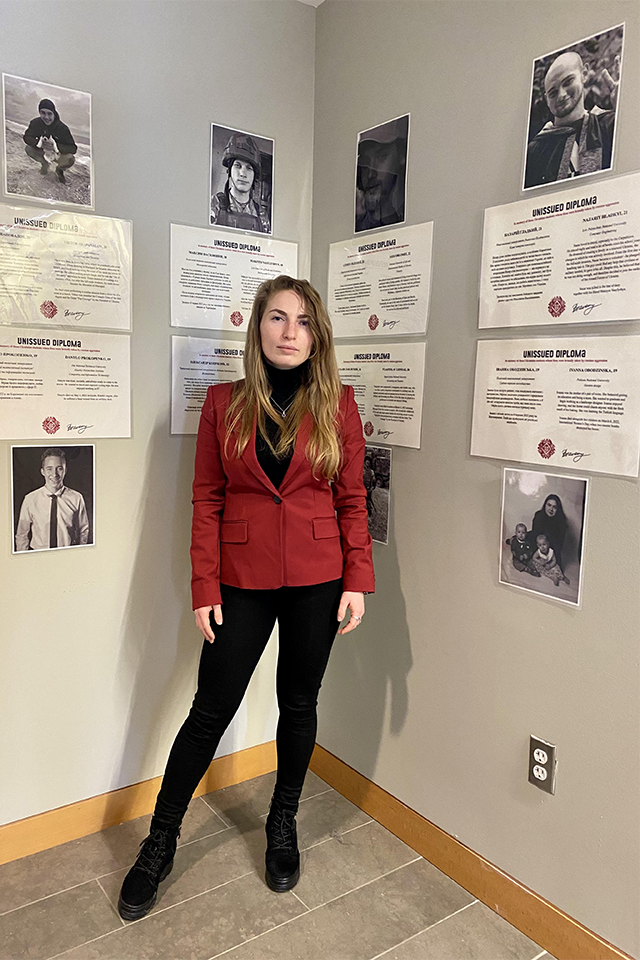A Letter to the World from Kamila Haeiva

Photo Credit: Kamila Haieva
Kamila Haeiva, Brandeis University International Business School MBA‘25
In 2024, I was honored with a Maurice J. and Fay B. Karpf & Ari Hahn Peace Endowment Award from Brandeis University’s Samuels Center for Community Partnerships and Civic Transformation (COMPACT). I used the award to participate in a 2025 conference on Ukraine, my homeland, and hope for its future. The gathering provided a chance for strategizing, sharing insights and knowledge, and for inspiring each other to action. Even with all of that, it was a concert at the conference featuring The Women's Bandura Ensemble of Chicago and The Indiana Slavic Choir that moved and indeed stuck with me the most. Below are some reflections on what I have been thinking about, and feeling, in response to that music and those voices.
Each of us carries stories shaped by loss. For some, it is the loss of loved ones. For others, it is the quiet, daily proximity to death or uncertainty.
February 24, 2022. Kyiv.
I woke at 4 a.m. to the deafening sound of explosions. It felt like the worst dream of my life had come true. I couldn’t believe it. I was in shock. This was supposed to be just another ordinary day—a day to go to work, study, and go to training. But in that moment, I stood frozen, unsure of what to do. At the time, I worked for Ukraine’s national postal operator, a government-run company that had remained operational even during the height of the COVID-19 pandemic due to its strategic importance.
My instinct was to go to work—business as usual. But when I looked out the window, I saw a flood of cars leaving the city. That early in the morning, traffic usually moved into Kyiv, not away from it. The contradiction stopped me. Everyone was leaving.
Am I supposed to stay? If I leave, where would I go? Do I even understand what’s happening?
After denial, I couldn't believe that the war had started. I was the person who told all my international friends that there would be no war. This is the 21st century, we strive for development and progress, to create a better life, a better future, and to be happy. No one is sick enough to start a war and destroy everything.
Then came grief. Paralysis. Anxiety. Depression. Insomnia. I compulsively scrolled the news, clinging to hope that this nightmare might end in just a few weeks. But day after day, I watched the world I loved disappear—restaurants, cinemas, cafes, beauty salons, museums, art galleries. Everything destroyed. People are dying, somewhere on the front, here in the city, your friends are dying, and who can say that you will not be next?
During that time, I volunteered at a hospital. I rarely slept more than two to four hours a night. Every sound startled me awake—each one a possible airstrike. When the sirens went off, I ran to the bomb shelter. But living in that cycle, day after day, week after week, for months, completely depleted me. My body and mind shut down. I couldn’t function. My hands trembled constantly. When your colleagues tell you that you should rest because your hands are shivering all the time, you understand that it's not ok. If you can't help yourself, you can't help others.
Eventually, I reached a phase of a kind of acceptance. I still couldn’t plan for the future—not for the next week, or even the next day. But I understood something fundamental: I could not stop the war. And I could not let it take my entire life. I can't live like this anymore. I don't want to live like this anymore. I accept. I will try to live. Live like never before. Not just survive. I returned to doing the things that brought meaning to my daily life—work, study, exercise, connection, and small moments of joy.
Then came adaptation. You get used to it, you know your actions, at every siren. I stopped running to the shelter each time; I was too exhausted to live in constant interruption. Instead, I focused on doing my best even more and even better. For those who had lost their lives, for those who could no longer speak, breathe, or dream. I chose to live in a way that honored them, with humility and gratitude.
This year and last, I helped bring an exhibition, “Unissued Diplomas,” honoring 40 Ukrainian students killed since russia’s full-scale invasion in 2022, to my university campus in the U.S. It honors the memory of those who will never have a chance to graduate.
Death gives context to life.
Birthdays mark time passing, but one day, we won't have any more time. And while it may feel uncomfortable, I believe it's healthy for us to think about our death. Acknowledging death reminds us that we are not the center of the story—something the human ego finds difficult to accept. It also forces us to face how little control we truly have. And that can be unsettling. People often say they wish they had more time. But more time for what? What would you do with that time?
Leaving a legacy isn’t optional. We create one every single day—through our words, our kindness, our silence, our choices, our actions, and every inaction.